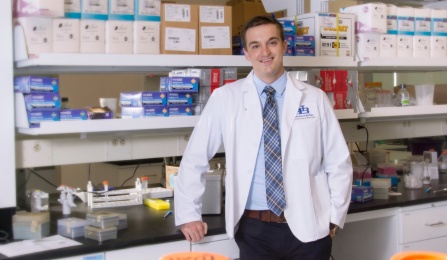Gregory Roloff, Class of 2017

Gregory Roloff’s entry into UB medical school last fall came on the heels of some heady research opportunities.
The Buffalo native had just spent more than a year at the National Institutes of Health (NIH) working in the National Cancer Institute (NCI) lab of Tom Misteli, PhD, a pioneer in the field of genome cell biology.
In the summer of 2011, Roloff was admitted to UB’s competitive CLIMB UP (Collaborative Learning and Integrated Mentoring in the Biosciences) Undergraduate Program, which lays the groundwork for graduate school, especially in fields related to drug discovery and translational science. Roloff worked in the lab of Satpal Singh, PhD, associate professor of pharmacology and toxicology, exploring the pharmacological aspect of drug interaction with the heart.
The summer before that, he landed in the stem cell lab of UB biochemist Te-Chung Lee, PhD, where the team used stem cells to regenerate heart tissue lost to cardiac disease. The experience led to his first published paper at age 20.
What has prompted Roloff to aggressively pursue such opportunities? “Everyone encourages you to do research in order to get into med school,” he explains. “I did it because I find it intellectually stimulating and am inspired to characterize disease with genetic and molecular detail.”
His passion for bench work was fostered as a biology major at SUNY-Geneseo, engaged in lab work on breast cancer. He completed his honors thesis in genetics and tumor immunology, deciding he would concentrate his career on cancer and become an oncologist.
Roloff’s experience at NIH proved exhilarating. He became involved in studying the cell biology and genetics that determine outcomes in prostate cancer and in efforts to locate possible DNA patterns to establish predictive measures.
“If we knew more about the underlying drivers that make a cancer indolent versus invasive, we would be able to transform the field,” he says. “For someone like me who loves research but also wants to become a clinician, it was the perfect combination of everything I was interested in.”
Roloff feels his lab experiences helped give him solid footing during his first year in medical school. “I love interacting with patients, and yet I love learning about the basic underpinnings of what it’s all about,” he says.
This summer, Roloff returned to the NCI, where he is working in the Laboratory of Molecular Immunogenetics, headed by Lauren Wood, MD, senior investigator in the Vaccine Branch.
Their work is focused on the immunological dynamics of human papillomavirus in HIV-infected adolescents enrolled in a vaccine trial.
For Roloff, the experience is just one more step in his bench-to-bedside quest.
